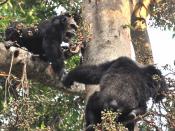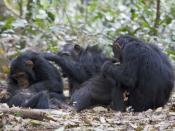As an associate professor of psychology, Sally Boysen has spent her career peering into the minds of our closest cousins, the chimpanzees. Her findings show that chimpanzees can be taught some human-like cognitive skills that never show in the wild. Boysen has taught chimps to count and to subtract and she documented their ability to think abstractly. Her work, sometimes is contentious, often sheds light on the way our own intelligence might have evolved.
Boysen can't say for certain if her plan to talk to the animals will work. She can say, however, that it's often human cleverness and patience that makes the difference, as in the experiment known as Big Room/Little Room. In this experiment, a researcher uses a scale model to show a chimp where a real object is hidden in a full-size room- a task human children can't grasp until age three. Though all of Boysen's adult female chimps performed the task immediately, it took five years before researchers could motivate the adult males to complete the task correctly.
There's no question that chimps in the company of humans experience changes in the brain," she says. "But that the species has the neuroplasticity to take in that information- that's not inconsequential. There aren't many other species like that."
Boysen is currently raising two baby chimps, Emma and Harper, each rejected by their mothers as infants. Lately, five-month-old Emma climbed out of her cradle in the middle of the night, and crept over to Boysen's bed where she lay sleeping. Emma head-butted Boysen into consciousness, and Boysen could see Emma's play face light up by the light from the hall. The infant chimp continued to play with her Boysen in the middle of the night. "It occurred to me," marvels Boysen, "baby chimps must do this...


